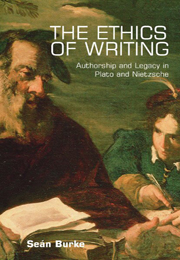Book contents
- Frontmatter
- Contents
- Acknowledgements
- Key to References and Abbreviations
- Prologue: Friedrich Nietzsche in Auschwitz, or the Posthumous Return of the Author
- Introduction: The Responsibilities of the Writer
- Chapter 1 The Ethical Opening
- Chapter 2 The Ethics of Legacy
- Chapter 3 Signature and Authorship in the Phaedrus
- Chapter 4 The Textual Estate: Nietzsche and Authorial Responsibility
- Conclusion: Creativity versus Containment: The Aesthetic Defence
- Bibliography
- Index
Chapter 2 - The Ethics of Legacy
Published online by Cambridge University Press: 12 September 2012
- Frontmatter
- Contents
- Acknowledgements
- Key to References and Abbreviations
- Prologue: Friedrich Nietzsche in Auschwitz, or the Posthumous Return of the Author
- Introduction: The Responsibilities of the Writer
- Chapter 1 The Ethical Opening
- Chapter 2 The Ethics of Legacy
- Chapter 3 Signature and Authorship in the Phaedrus
- Chapter 4 The Textual Estate: Nietzsche and Authorial Responsibility
- Conclusion: Creativity versus Containment: The Aesthetic Defence
- Bibliography
- Index
Summary
Why did Socrates compare himself to a gadfly? Because he only wished to have ethical significance. He did not wish to be admired as a genius standing apart from others, and fundamentally, therefore, make the lives of others easy, because they could then say ‘it is all very fine for him, he is a genius’. No, he only did what every man can do, he only understood what every man can understand. Therein lies the epigram. He bit hard into the individual man, continually forcing him and irritating him with his ‘universal’. He was a gadfly who provoked people by means of the individual's passion, not allowing him to admire indolently and eeminately, but demanding his self of him. If a man has ethical power people like to make him into a genius, simply to be rid of him, because his life expresses a demand.
(Søren Kierkegaard)One would not immediately associate the question ‘Who speaks?’ with Plato's Socrates whom we remember for impersonal questions such as ‘What is the Just?’ ‘What is the Good?’ Yet, the demand for a speaker or author to give a further account of what has been said or written in his name is central to the Socratic elenchus, to his insistence that an oral or written text give a further account of itself in a public forum. The Socratic mission involves the ethical demand of its interlocutor that Kierkegaard describes.
- Type
- Chapter
- Information
- The Ethics of WritingAuthorship and Legacy in Plato and Nietzsche, pp. 105 - 143Publisher: Edinburgh University PressPrint publication year: 2008



